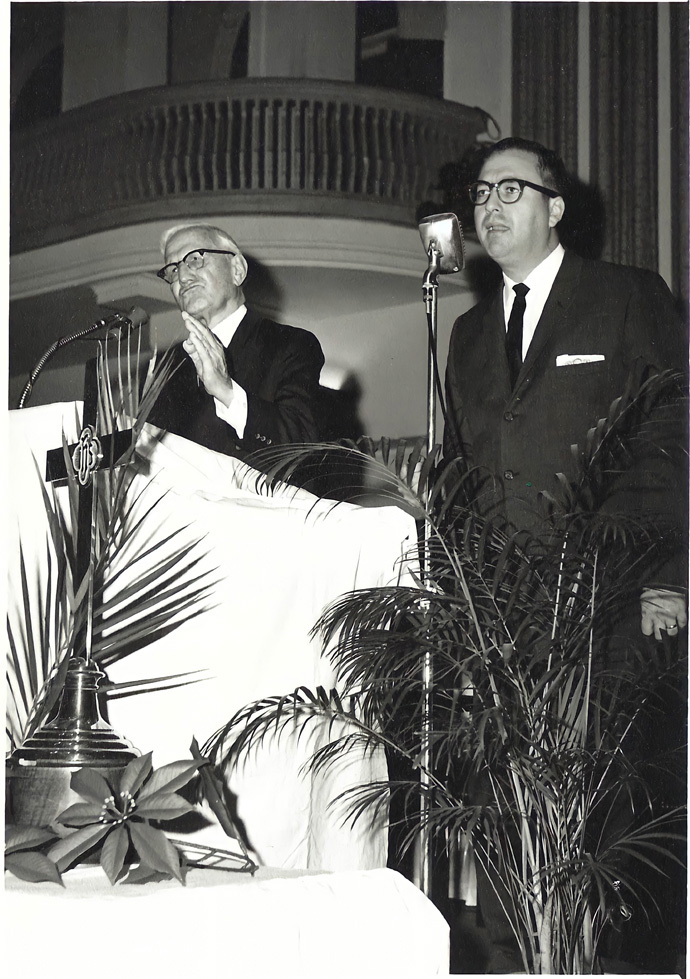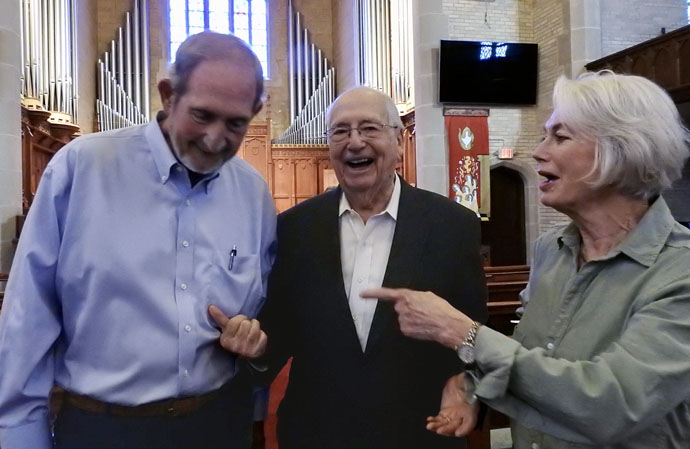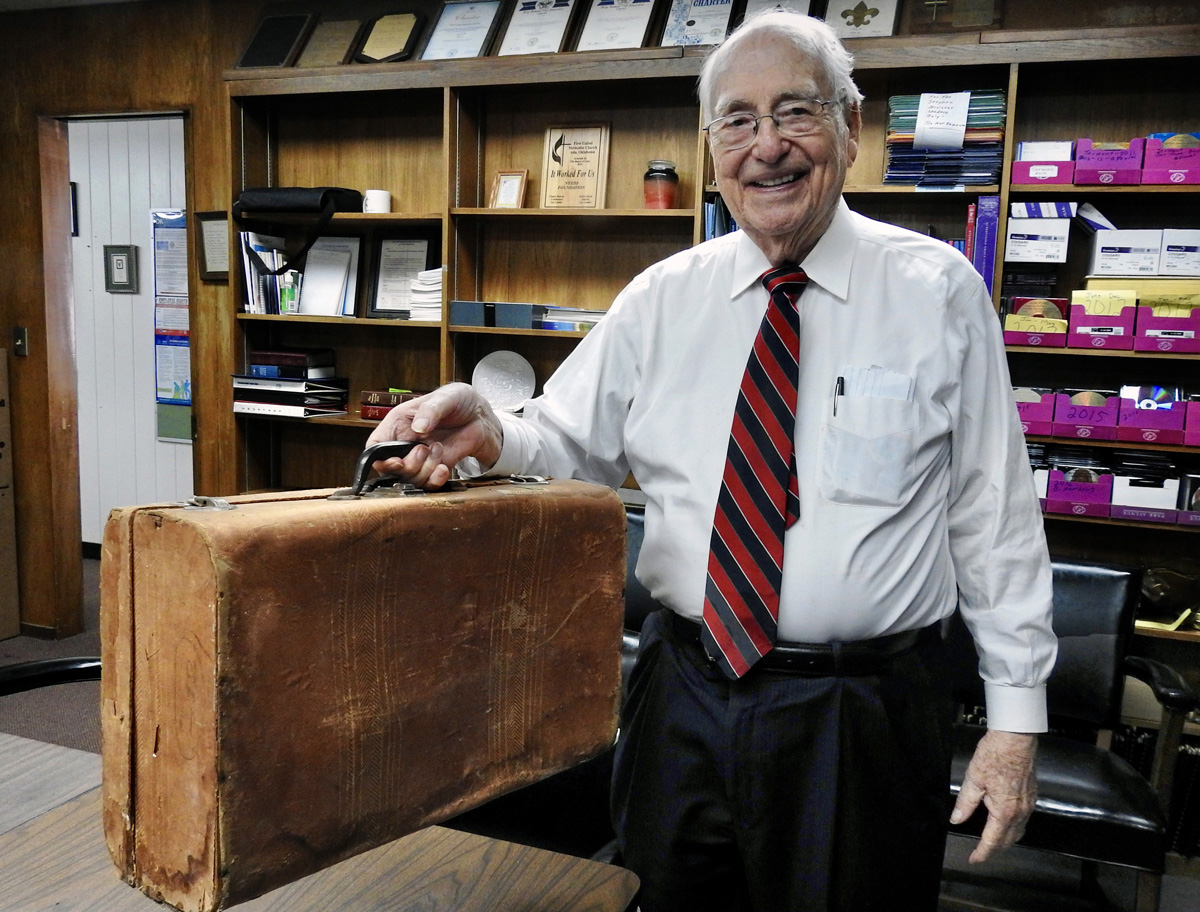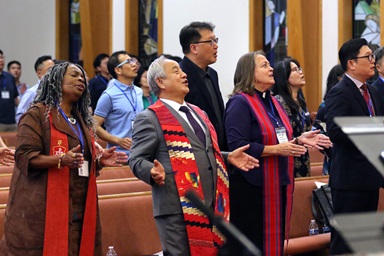Key Points
- The Rev. Roberto Escamilla is a living link to the great Methodist evangelist missionary E. Stanley Jones.
- Escamilla on his own made a big mark in Hispanic Methodist ministry.
- At 92, he’s still doing ministry, serving as a volunteer staff member at First United Methodist Church in Ada, Oklahoma.
The Rev. Roberto Escamilla counts his blessings, including that he’s 92 and still active in ministry.
“It’s just grace,” Escamilla said of his long life and career. “Grace, grace, grace. Amazing grace.”
Escamilla is a living link to the great Methodist missionary evangelist E. Stanley Jones (1884-1973), whom he served as Spanish-language interpreter and travel companion.
On his own, Escamilla created a substantial, often groundbreaking legacy in Hispanic United Methodist ministry as pastor, author, agency leader, teacher and more.
And his work goes on. Most afternoons, he’s in his untidy office at First United Methodist Church in Ada, Oklahoma, where he’s minister of evangelism.
He’ll grab a legal pad and a phone and contact recent visitors, encouraging them to join the church. He’ll call members who are ill or isolated or both.
“I primarily listen,” he said.

Escamilla has multiple graduate school degrees including a doctorate, but at First Ada he’s “Roberto” — embraced for who he is, not what he’s done.
“My husband loved him, and I love him,” said Mary Ann Briggs, a longtime church evangelism committee member. “He’s just a true Christian and exudes that feeling all the time.”
Escamilla was born in 1931, in Sabinas, Mexico, one of eight children in a poor, Catholic-turned-Methodist family. His father drove a taxi, and his mother kept house.
As a small boy, the future pastor nearly died of typhoid fever. But he grew up to be a keen student and graduated from a two-year Methodist college in Monterrey, Mexico, bent on becoming a physician.
While in Monterrey, he met W. Jefferson Dennis, a professor visiting from Parsons College, in Fairfield, Iowa. Dennis asked if he would like to study at Parsons and be his assistant for teaching Spanish classes.
Escamilla still has the worn suitcase he used for his bus trip to Iowa, made at age 17. He remembers coming with $20, knowing only a few words of English. He had no coat. A women’s circle in Fairfield corrected that.
“It was a nice one, and got me through the cold Iowa winters,” he said.
At Parsons, he learned English and continued on a pre-med path. But he felt a restlessness, a recurring “lump in the throat,” he recalls.
Relief came when he attended a revival service preached by the Rev. Lawrence Lacour at a local Methodist church. He answered an altar call and committed himself to ministry.
“I finally surrendered,” he said, using a verb crucial to his own and Jones’ understanding of Christian faith.
Escamilla would go on to study religion and philosophy at Iowa Wesleyan College, graduating in 1952. He then enrolled at Perkins School of Theology in Dallas.
An early preaching opportunity came in Oklahoma, at First Methodist Church of Fittstown, near Ada. One of the church women, Zuleme Delaplain, had a tradition of inviting visiting preachers to Sunday dinner.
Escamilla thus met his hostess’ daughter Dorothy, home from Oklahoma University. They fell in love, marrying at the Fittstown church on Dec. 24, 1954.
“My grandmother used to say, tongue in cheek, that she invited one preacher too many,” said the Rev. Paul Escamilla, son of Roberto and Dorothy. “But she loved him dearly.”
After Perkins, Roberto Escamilla was ordained as a Methodist clergyman in the Rio Grande Conference and appointed as pastor of El Divino Salvador Methodist Church in San Antonio, conducting services in Spanish and English.
In 1956, while serving that church, he was offered a scholarship to attend a Christian ashram in Kerrville, Texas, led by E. Stanley Jones.
Jones was world famous for his bestselling books and long missionary tenure in India, where he befriended Mahatma Gandhi and founded a spiritual retreat center and a psychiatric hospital. He devised and brought to the U.S. his own form of the Christian ashram, an Eastern-influenced spiritual retreat. Jones’ approach included periods of silence, prayer and Bible study, as well as evangelistic sermons and healing services.
Escamilla found his faith newly kindled at the ashram — and found a mentor in Jones.
“Brother Stanley always stressed the centrality of a personal encounter with Christ, the importance of growth toward maturity in our Christian walk and the urgency of serving him in this world,” Escamilla wrote last year in an essay recalling his experience with Jones.
Escamilla returned to Kerrville the next year for another Jones-led ashram. At the end, Escamilla approached the great man.
“I know you are not John the Baptist. You are an evangelist,” Escamilla recalled saying. “But would you consider baptizing our first-born baby girl, Dorothy Marlene?”
Jones performed the baptism. He and Escamilla stayed in touch. A few years later, the evangelist asked Escamilla to be his Spanish-language interpreter for the first leg of a speaking tour in Latin America.
“He said to me at the outset, ‘We will try it in Mexico and then decide about the rest of the trip,’” Escamilla wrote in an essay about Jones. “Thank the Lord, I got his vote of approval. He seemed to resonate and work well with my quick-flowing interpretation style. The interchange between us was like a rhythm, smooth and seamless.”

For much of the 1960s, Escamilla devoted vacation weeks to traveling with Jones and interpreting his sermons and even his counseling sessions. Escamilla also translated one of Jones’ books, “Victory Through Surrender.”
Before his death, Jones designated Escamilla and three others as guardians of the soul of the Christian ashram movement.
“Roberto has done that job phenomenally,” said the Rev. Tom Albin, director of development for United Christian Ashrams. “And he’s the last of the original four still living.”
Anne Mathews-Younes is Jones’ granddaughter and leads the E. Stanley Jones Foundation. She considers Escamilla a close friend and mentor, and in some ways a carbon copy of her grandfather.
“He has that exquisite sensitivity to the other person,” she said.
While the Jones influence was large, Escamilla brought a lot of his own talent and drive to preaching and other ministries.
Raul Alegria recalls as a boy hearing Escamilla preach a revival in Corpus Christi, Texas.
“It was powerful. It was personal,” said Alegria, a former president of MARCHA, the Hispanic caucus of The United Methodist Church. “Many people gave their lives to Christ as a result of hearing him preach the word.”
After his early years as a Rio Grande Conference pastor, Escamilla served with the Board of Global Ministries in Philadelphia and New York, where he also earned a degree at Union Theological Seminary.
He moved on to the Board of Discipleship (now Discipleship Ministries) in Nashville, where he was an associate general secretary over the division of evangelism, worship and stewardship — the first Hispanic to hold such a high United Methodist agency position. While in Nashville, he earned a doctor of ministry degree from Vanderbilt University.
For a time, he oversaw the Upper Room’s Spanish-language publications. He edited “Celebremos I” and “Celebremos II,” early Spanish-language songbooks for the church.
Escamilla contributed verses to “Pues Si Vivimos,” a Spanish-language hymn in the United Methodist Hymnal and Mil Voces Para Celebrar. The title means “When We are Living.”
“This gentle and reassuring Mexican folk hymn has quickly become a favorite song in both Spanish- and English-speaking churches in a variety of denominations,” wrote Discipleship Ministries’ Diana Sanchez-Bushong in a 2016 essay.
After his time with Discipleship, Escamilla returned to local church ministry under appointment as pastor of Los Angeles Heights United Methodist Church in San Antonio. That made him the first Hispanic appointed to lead a predominantly Anglo church in the Southwest Texas Conference.
For 50 consecutive summers, Escamilla taught in the Spanish-language Course of Study Program at Perkins, which in 2013 gave him a distinguished alumnus award. For three years, he held the E. Stanley Jones Chair of Evangelism at Methodist Theological School in Ohio.
Escamilla was in 1972, 1976 and 1980 a candidate for bishop in the South Central Jurisdiction, and in 1980 narrowly lost after multiple ballots.
But in talking about his life, Escamilla shares no regrets, only blessings — chief among them his wife of 68 years, with whom he has four children, 10 grandchildren and two great-grandchildren.
“The name ‘Dorothy’ means ‘gift of God,’ and she is a gift of God,” Escamilla told UM News, adding that because he traveled so extensively, she did most of the child rearing, while also having a career as a musician and teacher.
When Roberto and Dorothy finished full-time employment, they returned to live in the Fittstown community where they had met and married, and in 2000, he joined the staff of nearby First United Methodist Church of Ada.
Subscribe to our
e-newsletter
The first 18 years, he drew a salary. Since then, he’s remained on staff but has donated his time.
At First Ada, he launched an annual fall speakers’ series, bringing to the church bishops and leading seminary professors. He’s been a mentor and encourager to senior pastors, including the current one, the Rev. Brian Mathews.
“He’s my biggest fan. To hear Roberto, I’ve never preached a bad sermon,” Mathews said. “I would say he’s the most kind and caring individual I’ve ever been around.”
Two years ago, at age 90, Escamilla wrote a short book titled “Beacons of Hope,” published by the E. Stanley Jones Foundation.
Escamilla called it his last book, and in it he shares lessons he learned from Jones.
“He helped me understand evangelism and that the Gospel message applies to body, mind and spirit,” Escamilla wrote. “He taught me how to preach for a response, with an authentic appeal, which often included extending an invitation to the altar.”
Jones may be poised for a comeback. The E. Stanley Jones Foundation is gradually bringing his books back into print, and Christian ashrams have again begun to meet, after being sidelined by the pandemic. Abraham Verghese’s current bestselling novel of India, “The Covenant of Water,” includes a reference to Jones.
Escamilla is featured in a new podcast about Jones with Christian storyteller and broadcaster Stan Hustad. Seminary professors such as Len Sweet have written and spoken about how Jones’ message and example remain relevant.
While First United Methodist Church of Ada members are not experts on Jones, they know and revere Escamilla.
LaDona Hill, who has served with him on the church evangelism committee, insists his fluency goes beyond English and Spanish.
“The language of God is what he speaks.”
Hodges is a Dallas-based writer for United Methodist News. Contact him at 615-742-5470 or newsdesk@umcom.org. To read more United Methodist news, subscribe to the free Daily or Weekly Digests.




